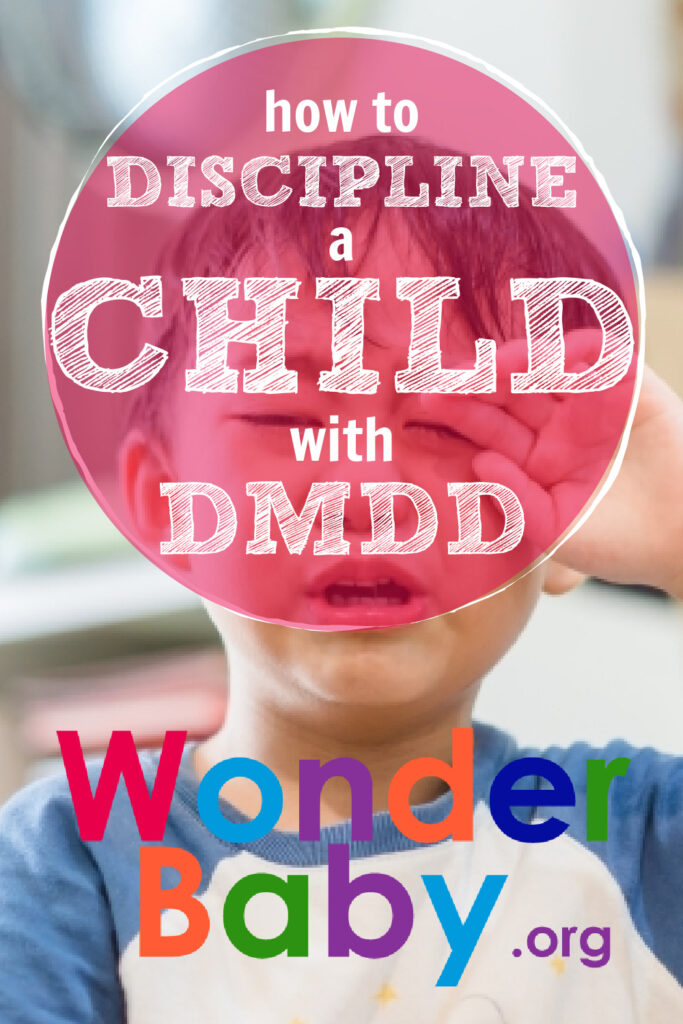How to Discipline a Child With DMDD

- Discipline involves teaching your child skills for emotional regulation.
- Parent training can teach you specific skills to help your child.
- It is essential to be consistent in using your discipline strategies with your child.
Do you wonder if your child is strong-willed or if something more is going on when they have frequent temper tantrums and an angry mood? Learning how to deal with emotions is something all kids have to go through. Still, some children have significant problems with emotional regulation and may be diagnosed with a mood disorder.
First identified as a diagnosis in 2013, disruptive mood dysregulation disorder (DMDD) is a mood disorder for children who display chronic irritability with severe temper outbursts. These children have a tough time controlling their emotions, leading to significant problems at home and school.
Parenting a child with DMDD has substantial challenges. As your child’s mood is irritable and angry, you may feel unsure how to help. You may become frustrated when you try different approaches to the outbursts without much success.
If your child is diagnosed with DMDD, they will have a medically managed treatment plan to help with their symptoms. As a parent, your role is essential to their success through learning about their illness and offering support with clear and consistent discipline.
How Do I Know If My Child Has DMDD?
Disruptive mood dysregulation disorder (DMDD) is a chronic mood disorder of childhood that causes significant impairments in the child’s life. The symptoms of DMDD include:
- Extreme, persistent irritability – Irritability occurs most of the day, nearly every day.
- Intense, frequent outbursts – Reactions are out of proportion to the child’s developmental stage. These outbursts occur three or more times per week.
- Difficulty functioning in more than one setting – Behaviors impact functioning at home, in school, and with other children.
If you’re concerned about your child’s aggressive behavior and severe irritability, talk with your child’s pediatrician.

Causes of and Risk Factors for DMDD
DMDD is such a new diagnosis that its causes are poorly understood, and research is ongoing.
Genetics may play a role in DMDD. One study found that depression of the mother either during pregnancy or after birth may be a risk factor.
Other mental disorders may occur together with DMDD. According to the Journal of Child and Adolescent Behavior, conditions that have a higher occurrence with DMDD include:
- Attention Deficit Hyperactivity Disorder (ADHD)
- Oppositional Defiance Disorder (ODD)
- Anxiety Disorders
- Depressive Disorders
- Conduct Disorders
DMDD Treatment and Diagnosis
Because of the profound impact DMDD has on a child’s life, it is essential to seek medical attention as soon as possible. After discussing your concerns with your child’s healthcare provider, your child may be diagnosed with DMDD if they are between the ages of 6-18 years old and have:
- Recurrent, severe verbal or behavioral outbursts three times a week or more
- Consistently angry or irritable mood most of the day nearly every day
- Reactions that are out of proportion and inconsistent with their developmental stage
- Symptoms occurring for at least 12 months
- Behaviors present in multiple settings (e.g., at school, at home, with peers)
After assessing your child’s behavior, your doctor will decide if their symptoms are consistent with the criteria for DMDD listed in the diagnostic and statistical manual (DSM). As other illnesses share some DMDD symptoms, your doctor must rule out other mental disorders, including bipolar disorder and oppositional defiant disorder.
Strategies for Disciplining a Child With DMDD
Discipline comes from the Latin word “disciplina” and means to teach with education and training. It’s important to note that sometimes this word can be confused with punishment. Your child will need a lot of parenting support and guidance through their DMDD journey.
Being the parent of a child with DMDD is incredibly stressful. It can be challenging to know what to do for a child with emotional dysregulation and how best to teach them. You may feel frustrated and conflicted during or after an outburst. Still, you can do things to help your child learn emotional regulation and promote positive behaviors.
- Stay calm during an emotional outburst. Remaining calm helps to model acceptable behavior for your child. If you feel your mood changing during an outburst, take a few deep breaths to bring calmness and awareness to your body.
- Identify your child’s emotions. When calm, talk about how your child felt during a temper outburst and name the emotion. This identification will allow your child to connect how they are feeling to specific emotions.
- Identify clear rules. Clear rules allow your child to know the expectations of your family. They create a sense of security for your child and help them identify appropriate behavior for different situations.
- Identify consequences. Making clear, logical consequences will allow your child to understand what happens when a rule is broken and gives them context for their action. Creating consequences for specific behaviors also gives you a framework for handling broken rules without making them up on the spot.
- Identify the trigger of an outburst. When your child is calm, review the situation to see if they can identify the trigger. Help them identify strategies to prevent an outburst when facing a similar situation.
- Utilize positive reinforcement. Sometimes it’s easy to get caught up in things that aren’t going well. But think about all of the things your child is doing right every day. Are they getting out of bed? Are they brushing their teeth? Are they able to sit through a meal? Call out what they are doing right, and your child will naturally crave positive feedback.
- Implement a reward system. Does your child enjoy ice cream, electronic time, or dedicated parent time? Create a reward system that is unique and age-appropriate for your child. Pick an area they are working on and reward them with the thing that inspires appropriate behaviors. An example may be when your child goes to bed calmly for five nights, they will earn 15 extra minutes of reading time.
- Consider time-ins as an alternative to time-outs. Time-outs can leave your child feeling isolated and increase their anger and frustration. Your child may respond better to connecting with you than being separated.
Whatever strategies you choose to use with your child, it is essential to be consistent.

Professional Interventions for DMDD
Your child will require professional interventions when diagnosed with disruptive mood dysregulation disorder. There is no specific guideline for the treatment of DMDD. A treatment plan includes therapies that have been successful for illnesses with similar symptoms and may consist of psychotherapy, medication, or a combination of both.
Psychotherapy
A commonly used form of psychotherapy for DMDD is cognitive behavioral therapy (CBT). Therapists teach kids how to identify feelings and determine triggers that cause irritability and anger. Your child learns coping skills and practices these strategies.
With repeated exposure to triggering situations, your child should have an increased frustration tolerance and improved communication skills.
Medications
The U.S. Food and Drug Administration (FDA) has not approved any medication specifically for disruptive mood dysregulation disorder. However, there are medications successfully used to manage conditions with similar symptoms. These medications may include stimulants, antidepressants, and atypical antipsychotics.
Parent Training
Caregivers are essential to a child’s success with DMDD, and a parent training program can teach you the necessary skills to support your child. Through the program, you learn what triggers your child’s irritability and develop skills to deal with outbursts. After some time, you will anticipate when an outburst may occur and implement strategies to avoid them.
FAQs
How early can I use discipline for my child?
Discipline is about teaching your child through support and training. You can start this parenting skill from day one! It is essential to be consistent for your discipline to be effective. Once your child is on the move, there will be plenty of time to practice.
When should we seek professional help?
Temper tantrums typically occur between the ages of one and four, lasting between two and 15 minutes. Talk with your doctor if you are concerned that your child is having extreme or prolonged outbursts for their age.
Will DMDD affect my child for the rest of their life?
With a treatment plan in place, children generally develop better skills for emotional regulation. However, they will continue experiencing intense emotions. According to the National Alliance on Mental Illness, kids diagnosed with DMDD may develop anxiety and depression as they get older.

Related Posts

Behavior
Understanding Intermittent Explosive Disorder in Children
Are you worried about your child’s unexpected aggression and explosive behaviors? Learn how to support a child with intermittent explosive disorder.

Behavior
5 Emotional Regulation Activities for Kids
Want to teach your child how to regulate emotions? Here are emotional regulation activities for kids that can help!

Behavior, Special Needs
5 Tips for Dining Out with Children Who Have Sensory Sensitivities
Worried about dining out with sensory sensitivities? Try these tips for less stress and more fun the next time you take your family out to eat.